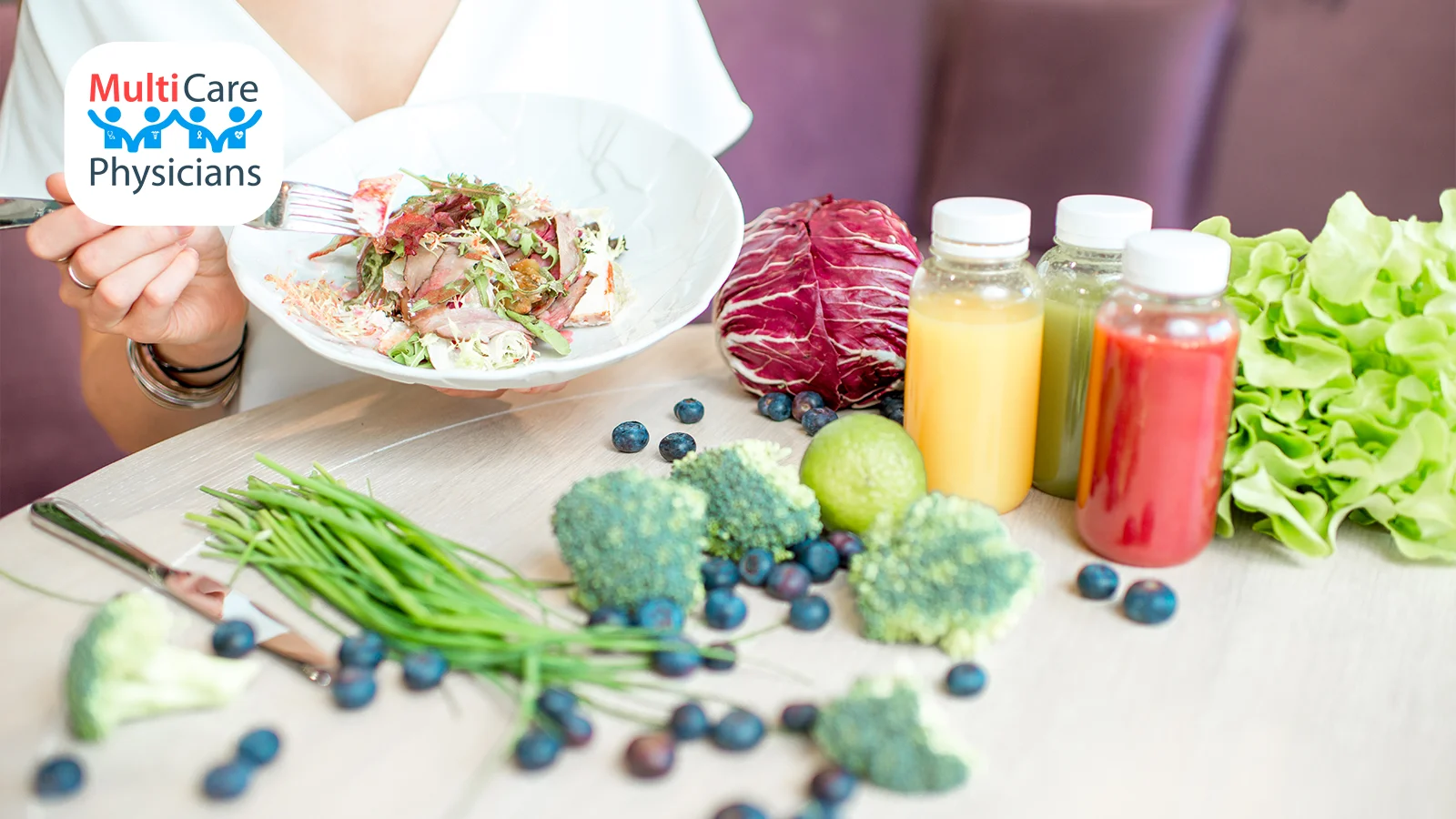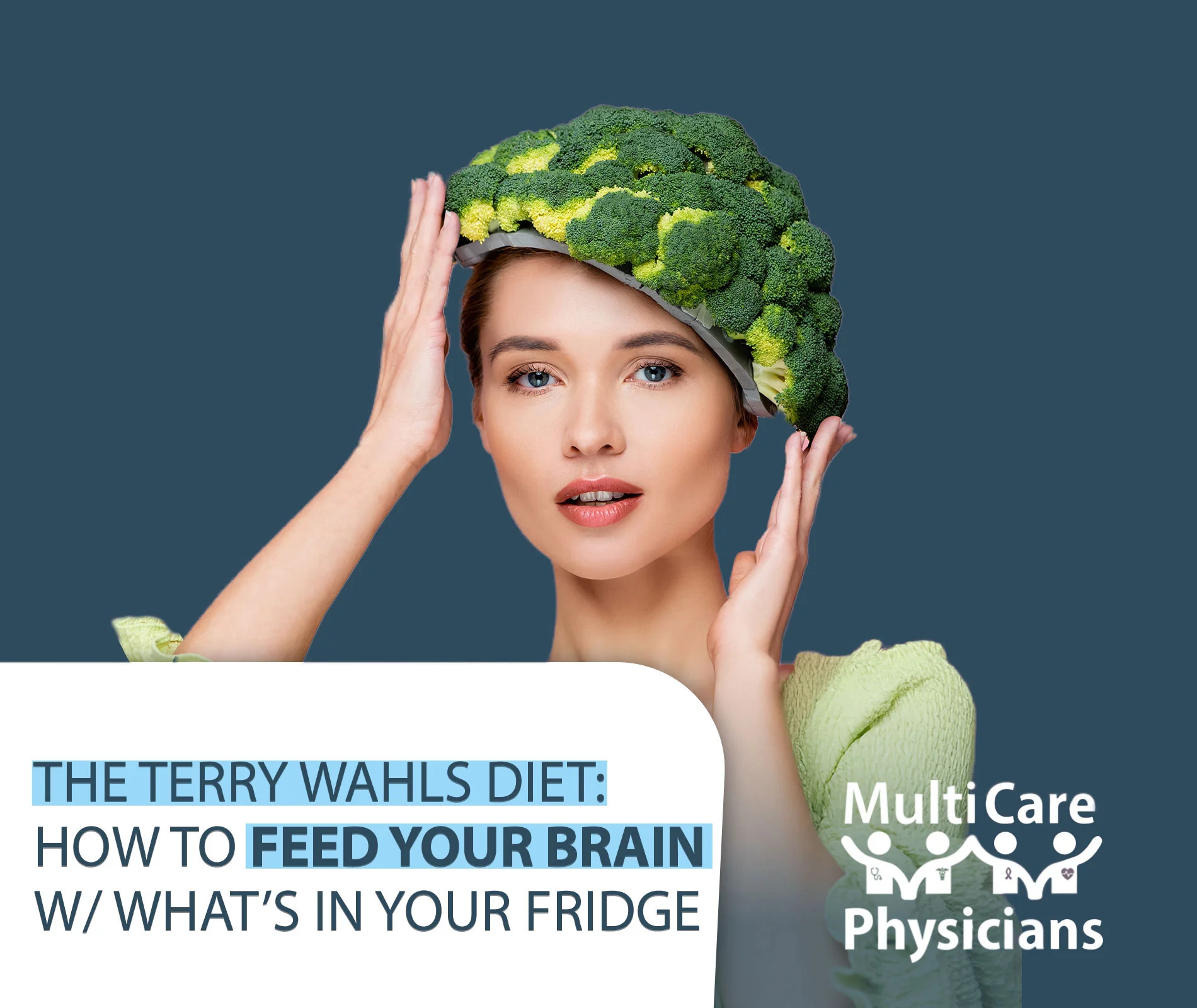“It occurred to me, that I should get my long list of nutrients from food [rather than supplements]. That if I did that, I would probably get hundreds and maybe thousands of other compounds that science had yet to name, that would be helpful to my brain and my mitochondria.”
~ Dr. Terry Wahls
Take a minute and think about what you have eaten in the past day. How many fruits and vegetables have you eaten in the past 24 hours?
Before you answer, I want to be clear: I’m talking about REAL fruits and vegetables from the produce section.
The kind you have to wash, chop and peel. No strawberry-flavored granola bars. No Lean Cuisines with a side of processed spinach. No “Veggie chips” that come from a bag.
One plate full? Two? Three?
To be honest, a year ago, I could probably fill only 1 cup with the amount of fresh fruits and vegetables I ate in one day. And that is being generous.
I still thought I was eating healthy, and by American standards I was.
I ate oatmeal every morning for breakfast or an occasional egg white omelet. I ate soups, salads and avoided fried foods, fatty meats and too much sugar.
However, the “food” that got me through most of day was protein and carbs.
Very little of my energy came from the foods that have sustained human life for 2,000 years.
Then, I found Terry Wahls.
She is a professor of medicine at the University of Iowa and renowned worldwide for defeating her own progressive Multiple Sclerosis (MS) through the power of FOOD.
That’s right, food healed Dr. Wahls, not modern medicine. It sends a divine message to us all to pay a little more attention to what’s on our plates.
What Did Dr. Wahl’s Learn about Food & Our Brains?

When years of MS treatment (chemotherapy, pharmaceuticals, etc.) left her confined to a wheelchair for four years, Dr. Wahl’s set out to restore the function of her brain (and her mitochondria cells) through nutrition.
She experimented with the Paleo diet and did research on Functional Medicine.
She quickly discovered that there are a handful of essential vitamins, minerals and nutrients our brains need to thrive.
She also discovered that by feeding her brain, she could reverse chronic disease!
After learning about this diet, and trying it out for myself, I have experienced the following: a better mood, increased concentration, weight loss, more alertness and less brain fog.
What Nutrients are Essential to Our Brain Function?

Our brains (and our mitochondria) can rebuild and heal themselves when we give them the proper fuel. These essential “ingredients” to brain function must be consumed on a weekly or daily basis.
1. Dark, Leafy Greens
Dark, leafy greens such as spinach, kale, bok choy, radish greens or beet greens are rich in all categories of Vitamin B, which are essential to your cell function and brain health.
They also include Vitamins A, C and K. These are vitamins we often attribute to other foods, such as oranges which provide Vitamin C.
But if you are eating a varied diet of fruits and vegetables and aiming for variety, you should be able to get these nutrients without taking a supplement.
While Dr. Wahls recommends eating 3 cups of greens per day, this is the raw measurement. So, 1 cup of cooked spinach, kale or bok choy will help you meet this requirement easily.
Just watch out for unhealthy oils, like canola oil or sunflower oil.
These are prevalent in off-the-shelf kale chips because they are cheap and easy to use. (Plus you can grow kale yourself in your own backyard and make it part of your landscape design!)
Stick with cooking your greens on low heat with olive oil or coconut oil.
That way, you get all the good stuff and none of the bad!
2. Sulfur-Rich Vegetables
Your brain and mitochondria also need a great amount of sulfur to thrive and grow.
Sulfur can be found in cruciferous vegetables, such as broccoli and cauliflower, as well as mushrooms, onions, red and green cabbage and garlic.
In fact, garlic is such a powerhouse of sulfur that just one or two cloves can meet your sulfur requirement for the day.
You can easily saute your mushrooms and garlic with your greens to pair with a side of grass-fed meat for dinner. Or, make homemade cauliflower popcorn or cheeseless cauliflower pizza with mushrooms, onions and spinach on top.
3. Color-Rich Fruits & Vegetables
Antioxidants are also essential to protecting the growth of brain and mitochondria cells.
They support cell growth and reduce and/or prevent inflammation, which is a leading cause of autoimmune disorders like Parkinson’s and MS.
The good news is that essentially any fruit or vegetable rich in color will be rich in antioxidants: beets, carrots, bell peppers (red, green and yellow), peaches, blueberries, blackberries, strawberries, purple cabbage, cranberries and even artichokes and pecans.
Again, these fruits and vegetables can easily be added to that morning smoothie, cauliflower pizza, soup or salad. Spinach salad with pecans, mushrooms and strawberries.
Stuffed red bell peppers with kale, garlic and onion. Beef soup with carrots, broccoli and onion. Beet, strawberry and carrot smoothies.
The possibilities are endless, and so are the health benefits!
4. Fatty Fishes & Grass-Fed Meats
Omega-3 fatty acids are absolutely essential to our brain health. However, most of us have our Omega-6 to Omega-3 ratio way out of whack.
In other words, we’re clogging our bodies with the wrong fats! Historically, humans evolved eating foods with a 1:1 Omega-6: Omega-3 ratio.
Today, the average Western diet has a ratio of between 15:1 to 17:1. The recommended ratio in today’s standards is 4:1.
So, how do you reach the optimum levels of both fats? First, reduce the amount of processed foods you eat, which are loaded with Omega-6.
Second, increase your intake of Omega-3, which can be found in wild salmon, grass-fed beef, sardines, walnuts and flaxseeds.
While supplements like fish oil can be beneficial, they are processed by the body differently than fresh sources of fish and Omega-3. As always, balance is key.
5. Iodine
Iodine is another essential ingredient in the brain cell growth process.
Many doctors estimate that up to 75% of normal, healthy adults do not consume enough iodine, and this deficiency has increased incredibly over the past 40 years.
Iodine is essential to cell growth and a lack of iodine is linked to obesity, heart disease, cancer (especially breast cancer) and cognitive impairment.
Excellent sources of iodine include: seaweed and other sea vegetables (kelp, arame, kombue, hiziki), iodized salt (not found in kosher salt or sea salt), meats and cranberries.
Dr. Wahl recommends eating at least one serving a week to make up for this deficiency. If you know you are low in iodine, I would start with 2 per week in the beginning.
How Can You Eat Like This Every day?

It’s easy! You don’t have to eat all organic, but keep in mind the “Clean Fifteen” and “Dirty Dozen” list from the Environmental Working.
This will help you know which foods to buy organic and/or which ones to wash more thoroughly with vinegar to remove pesticide residue.
Also, PheonixHelix.com has a great Q&A that addresses other questions, like how to get variety and how many cups is enough each day.
Here are some quick tips we gleaned from Pheonix Helix and Dr. Terry Wahls that might make it easier:

• Throw all your veggies in a soup made with bone broth and have one serving each day of the week
• Toss spinach and colorful fruits and vegetables into a high-powered blender and enjoy that for breakfast every morning
• Make cabbage and/or spinach wraps using grass-fed meat and dressings with healthy fats (olive oil, coconut oil or ghee)
• Have a fresh salad every day or every other day and top with Omega-3 rich foods, such as salmon, tuna or chia seeds
• Avoid all inflammation-causing foods, such as dairy, gluten and sugar
Challenge yourself to try this diet for at least one month. If you have more energy, less brain fog, weight loss, better concentration and/or a better mood, you know you are giving your mitochondria the food they need to thrive!
Your brain will thank you for years to come. And if you are in the Orlando area and need women’s health care, geriatric medicine, or pediatrics care, our Lake Mary family practice is here for you, offering a complete spectrum of care!
Disclaimer: MultiCare Physicians provides the [www.multicaredocs.com] Website as a service to the public and Web site owners.
MultiCare Physicians is not responsible for, and expressly disclaims all liability for, damages of any kind arising out of use, reference to, or reliance on any information contained within the site.
While the information contained within the site is periodically updated, no guarantee is given that the information provided on this Website is correct, complete, and up-to-date.
Although the MultiCare Physicians Website may include links providing direct access to other Internet resources, including Websites, MultiCare Physicians is not responsible for the accuracy or content of information contained in these sites.
Links from MultiCare Physicians to third-party sites do not constitute an endorsement by MultiCare Physicians of the parties or their products and services.
The appearance on the Web site of advertisements and product or service information does not constitute an endorsement by MultiCare Physicians, and MultiCare Physicians has not investigated the claims made by any advertiser.
Product information is based solely on material received from suppliers.

